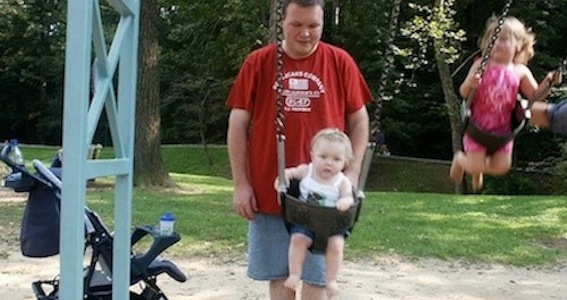Last week Nicole Rodgers wrote a great piece on stay-at-home dads. Although the idea of a stay-at-home parent is nothing exceptional, if the primary caretaker is a father, you can almost hear the sound of societal norms shaking and cracking. We hold a deeply ingrained belief that mothers are natural caregivers – they gestate the baby and are equipped to feed it, which surely means they’re supposed to do everything else as well, right? After all, it’s only natural. Just recently, I was talking to a cousin who was telling me how her husband (an otherwise perfectly nice guy) expects her to do the majority of the work with their two small children because it comes ‘naturally’ to her as a female and he’s just not hardwired to do it properly.
Opinions like these really rub me the wrong way for a number of reasons. First, I’ve read enough about the biology and psychology of parenthood and bonding to know they’re just plain wrong. Second, and more personally, my dad was a stay-at-home parent for a few years. He was (and still is) very involved in his children’s lives. And guess what? He did a great job and we turned out just fine. There’s nothing in a women’s biological or psychological make-up that makes her better equipped to change diapers or know why the baby’s crying. These are skills that come with experience, not the natural result of having two XX chromosomes. Fathers can be just as loving, patient, and caring as any mother. They just have to want to play that role and be given the space to make the same mistakes any mother would, without having their slipups blamed on their gender.
In a lot of ways it’s much easier for a patriarchal society to ascertain that mothers are the ‘natural caregiver’ and should stay home with the kids. This attitude removes women from the public sphere and, additionally, the superficial praising of ‘women’s work’ doesn’t typically result in any tangible political and financial gains (After all, if mothers are really such honored members of society, why is America the only developed country with no national policy regarding maternity leave?). The main arguments in favor of it being natural for mothers to look after their children while fathers provide are that it’s what our ancestors did and it is generally the way it is done in nature (which is just ridiculous. Even if we narrow nature down to our closest relatives, the primates, it should be noted that primates live in harems, kill their babies, and forge political alliances through sex. Humans may do all those things, but not many applaud them as the natural way to go!). Thus, if we look closer, this whole ‘natural mothers’ business is another theory destroyed by pesky facts.
Decades ago Sarah Blaffer Hrdy, a preeminent anthropologist, studied motherhood in different cultures as well as among primates. This research was originally thought to not be as interesting as ‘real research topics,’ such as collaborative hunting or warfare. After all, it was considered a rather obvious thing – mothers are mothers, so what is there to study? Fortunately, Prof. Blaffer Hrdy decided there was something there. The results of her research have been published in two books: Mother Nature and Mothers and Others (the title of which I’ve obviously borrowed for the title of this essay).
In these seminal (and very readable) books, she demonstrates how there’s very little that’s ‘natural’ about motherhood. Motherhood as we know it today is a societal construct, much like gender. Parenthood needs to be learned and involves help from people other than the primary giver – that much is clear and natural. She argues that we should be investing in good childcare infrastructure, such as affordable childcare options and a good pre-kindergarten schooling system, and not telling women that their breasts, uteruses, and hormones give them a semi-mystical childcare skillset. As for the hormones – fathers have actually been shown to also produce an oxytocin spike (the ‘love and bonding’ hormone that is produced in its highest quantities in women after they deliver a baby) and then sustain this production if they spend time with their children. Fatherhood is every bit as natural as motherhood, and men have all the required biological pieces.
However, the most important thing to remember is not the biology of parenthood. I’m risking sounding very cliché here, but I’ll go ahead and say it anyway: what makes great parents is in hearts and minds. I don’t know how much oxytocin had to do with the fact my dad is just a great dad. Personally, I think the real evidence was how much time he spent with us. He saw talking to my sister and me and taking us on all sorts of outings (from pet shows to philharmonic concerts for children) as just about the best thing he could do with his time. He was never too ‘manly’ to make our packed lunches or pick us up from school and somehow he never lacked my mom’s natural skills in stroller-pushing and diaper changing. I have yet to experience parenthood for myself, but my parents (and a ton of anthropological/evolutionary/ sociological reading) taught me this much: fathers are no less ‘natural’ than mothers. It takes the same amount of effort, love, and care no matter what your gender.
Maria M. Pawlowska is healthcare analyst with a passion for reproductive health and gender issues. Her articles on different aspects of reproductive and women’s rights have been published by The Maternal Health Task Force, RH Reality Check, HealthyPolicies, The European Pro-Choice Network, and The Good Men Project among others. Maria currently lives in London with her husband. You can reach her at: m.pawlowska@gatesscholar.org or on Twitter @MariaPawlowska.
Photo credit jcummings/Flickr
Related Links:

